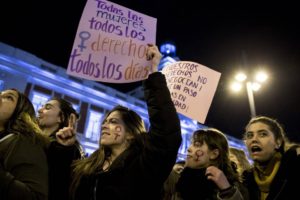
International Women’s Day in Spain is celebrated with the “Huelga Feminista” (Women’s Strike). Last year, in March, women took to the streets for the first time in this strike to show the people of Spain that they were not to be silenced. Compared to the annual Women’s March on a Saturday in January in the United States, this women’s march in Spain starts on March 7 and continues until the night of March 8. Therefore, women are neither at work nor in their homes. Men who stand in solidarity run daycare and childcare services for the day in order to allow women to take the streets and not have to worry about their children at home. One aim of the strike is to go beyond just removing women from the working force for a day, but also illuminating the ‘invisible tasks’ that women do in the private and public spheres. The official 8M (March 8) website states that:
“The limitations of a classic strike to appeal women’s issues are basically two:
1. A large number of women work in irregular or extremely precarious conditions that, in practice, make it almost impossible to exercise the right to strike. Among migrant women, this number is even higher.
2. Most of the work carried out by women does not take place in the labor market but in the home. Reproductive work takes up most of our time, whether or not we have a job.”
In 2014, Spanish women mobilized to defend their reproductive rights and were able to stop the passing of a bill that would penalize voluntary abortion. Here, the women of Spain had a “concrete struggle that united [them]” and at the time felt that the movement would not go any further. Nevertheless, the women of Spain were inspired by women’s movements across the globe, like “International Women’s Strike (PIM/IWS), promoted by Latin American and Polish sisters who managed to coordinate a global action in which more than 50 countries participated.” Soon after seeing the mass mobilization of women all over, the women of Spain began to ask themselves: “Why not us?”
During the 1920s and early 1930s, Spain appeared to be moving on a progressive path, granting women suffrage in 1924, and supporting women in education and arts during the rise of the Second Republic (Spain’s first attempt to achieve a democratic society following years of monarchical rule). However, after the Spanish Civil War (1936-39), the regime of Francisco Franco regressed any progress that Spanish women had made. Although the reign of Franco ended in 1975 and the Spanish government and people have made large strides in the promotion of women’s rights, there is still room to grow. Spain is a divided country, constantly battling over the balance of progress and preservation of traditionalist ideals. While some want to move forward and support progressive social movements, the other half remains attached to the idea of a “traditional Spain”, one that limits the rights of women, minorities, and migrants, as well as promotes the Catholic Church.
El País, a renowned Spanish publication (like Spain’s New York Times), published an article, “Cinco cosas que tu abuela no podía hacer y tú sí, mujer” (Five things that your grandmother could not do and you could, woman), explains limits that women faced during the Franco regime, that honestly, most people accepted as just a part of life. Some examples include:
- “Until 1972, when a law reformed the Civil Code, women under 25 needed to have parental permission if they wanted to become independent, go live on their own.” The only way to supersede this law was through religious exemption or marriage.
- “Before a legislative reform in 1954, a woman who married a foreigner lost Spanish nationality.”
So, on Friday, March 8, the women are not only taking the streets for the women of Spain but women all across the world. The women of Spain are saying to women from all walks of life: “you are seen, you are heard, and together we are stronger.”
“Juntas somos fuertes.”
Tori Bianco



